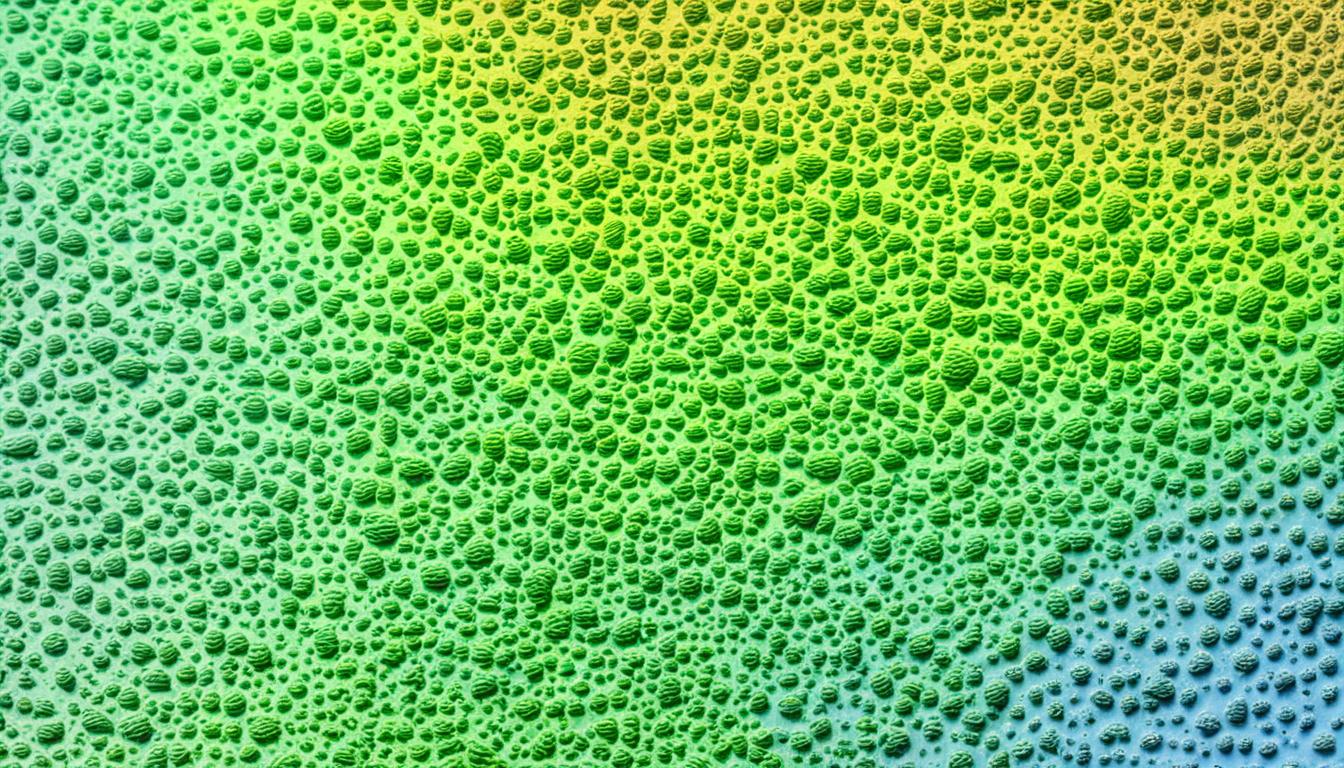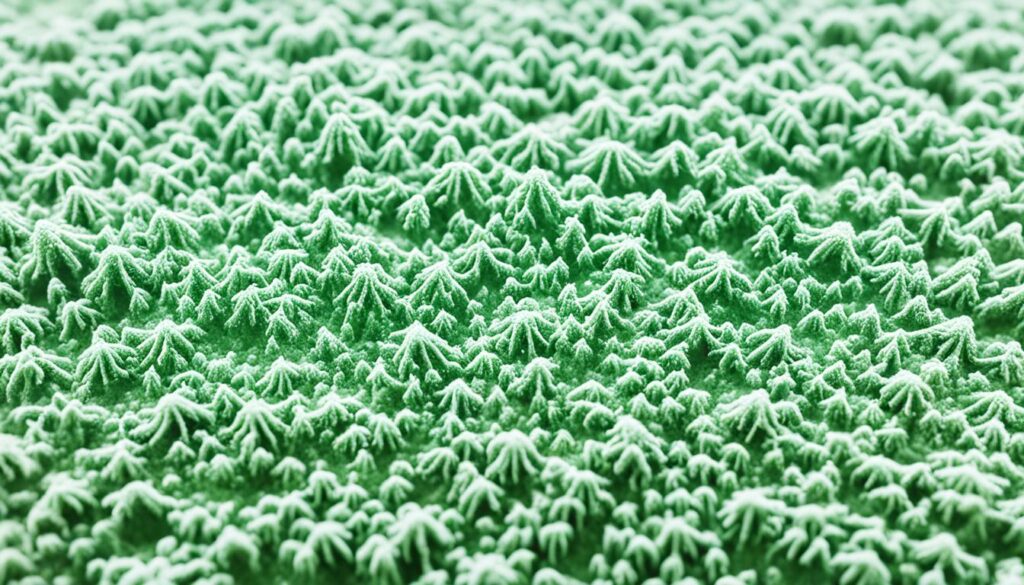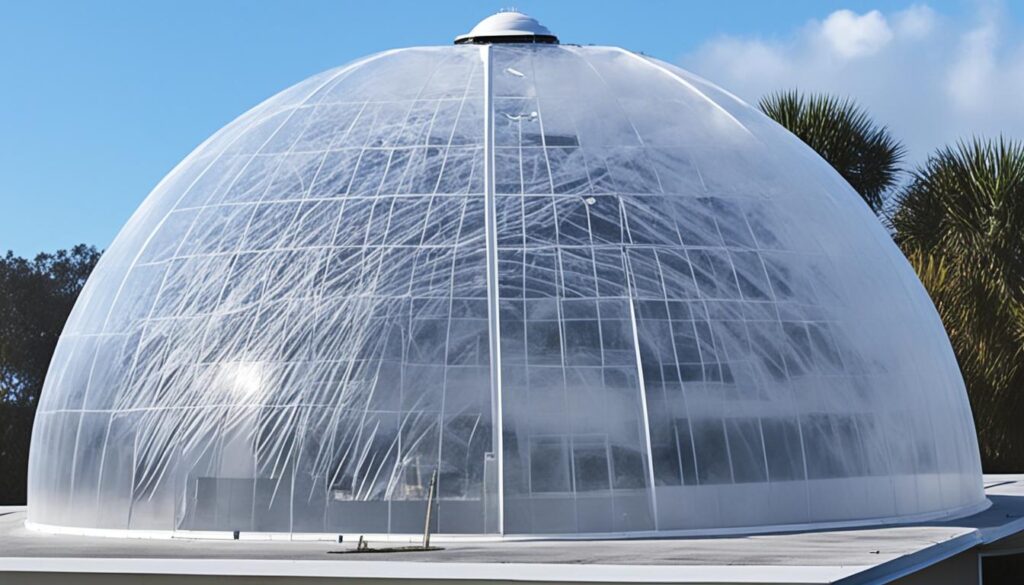
Understanding Mold Spores in Florida’s Climate
Welcome to our informative article on understanding mold spores in Florida’s unique climate. As residents of the Sunshine State, it’s crucial to be aware of the potential risks of mold infestations and take proactive measures to protect your home and loved ones. This article will provide you with expert insights and practical tips to safeguard your living environment from the challenges posed by mold spores in Florida.
Florida’s humid climate creates ideal conditions for mold spore growth. With high levels of moisture and warm temperatures, mold can thrive and spread rapidly. It is important to understand how these factors contribute to potential infestations and how you can effectively combat them. By implementing preventive measures, you can maintain a healthy, mold-free home.
Key Takeaways:
- Florida’s humid climate promotes the growth of mold spores.
- Moisture control is crucial in preventing mold infestations.
- Regular inspections can help identify early signs of mold growth.
- Proper ventilation helps reduce moisture levels in your home.
- Effective cleaning techniques can remove existing mold and prevent its recurrence.
The Role of Florida’s Humid Climate in Mold Spore Growth
In the state of Florida, the humid climate plays a significant role in promoting the growth and spread of mold spores. Mold, a type of fungus, thrives in environments that are warm, moist, and humid. Florida’s high humidity levels throughout the year provide the perfect breeding ground for mold spores to flourish.
The combination of warm temperatures and abundant moisture creates the ideal conditions for mold spore growth in Florida. The average humidity in Florida often surpasses 70%, which is well above the threshold where mold can thrive. When the moisture in the air reaches this level, it encourages the release of mold spores into the environment.
Once mold spores are released, they can easily spread and settle on surfaces within homes and buildings. These spores can be carried by air currents, pets, or individuals. When they find favorable conditions, such as areas with high humidity and organic materials, they begin to grow and multiply rapidly.
The Ideal Temperature and Moisture Levels for Mold Spores
Mold spores thrive in temperatures ranging from 70°F to 90°F (21°C to 32°C). Florida’s warm climate provides the perfect temperature range for mold growth. Additionally, mold spores require moisture levels above 60% to initiate and sustain their growth. With Florida’s humid climate, moisture levels often exceed this threshold, creating an environment conducive to mold infestation.
Florida’s humid climate creates the perfect storm for mold spore growth. The combination of warm temperatures and ample moisture provides an ideal breeding ground for mold. It’s essential for residents in Florida to be proactive in taking measures to prevent mold infestations and protect their homes.
To effectively combat mold spore growth in Florida, it is crucial to control indoor humidity levels and prevent excess moisture buildup. Proper ventilation, using dehumidifiers, and regular maintenance of HVAC systems can help maintain optimal humidity levels and minimize the risk of mold infestations.
By understanding the role of Florida’s humid climate in mold spore growth, homeowners can take proactive steps to safeguard their properties from potential mold-related issues. Educating oneself about preventive measures and seeking professional advice is essential to ensure a safe and healthy living environment for all.

Protecting Your Home from Mold Infestations in Florida

Living in Florida means enjoying beautiful weather and a vibrant outdoor lifestyle. However, it also means dealing with the challenges of a humid climate that can contribute to mold infestations in your home. To protect your home and ensure a healthy living environment, it’s crucial to take preventive measures against mold growth. Here are some actionable tips:
1. Moisture Control
“Moisture is the number one factor that contributes to mold growth.”
Mold thrives in damp environments, so it’s essential to keep your home dry. Fix any plumbing leaks promptly, and ensure proper ventilation in moisture-prone areas such as bathrooms, kitchens, and basements. Use dehumidifiers or air conditioners to maintain optimal humidity levels below 50% to discourage mold growth.
2. Regular Inspections
“Early detection is key to preventing mold infestations.”
Regular inspections of your home can help identify and address mold issues before they become severe. Pay close attention to areas that are prone to moisture buildup, such as around windows, under sinks, and in basements. If you notice any signs of mold, such as a musty odor, discoloration, or water stains, take immediate action to address the problem.
3. Proper Ventilation
“Good airflow promotes a healthier environment.”
Proper ventilation plays a crucial role in preventing mold growth. Ensure that your home has adequate airflow by opening windows regularly, using exhaust fans in bathrooms and kitchens, and keeping air ducts clean and free from obstructions. By promoting air circulation, you can reduce excess moisture accumulation and create an environment that is less favorable for mold growth.
4. Effective Cleaning Techniques
“Regular cleaning helps prevent mold before it becomes a problem.”
Regular cleaning is essential for mold prevention. Use appropriate cleaning products and techniques to remove mold-friendly environments, such as soap scum, dirt, and dampness. Pay special attention to areas where moisture tends to accumulate, such as shower walls, sinks, and windowsills. By maintaining cleanliness, you can significantly reduce the risk of mold infestations.
By following these preventive measures, you can protect your home from mold infestations in Florida’s humid climate. Keep in mind that if you’re dealing with a significant mold problem, it’s best to seek professional assistance to ensure thorough remediation and prevent further damage. Remember, early prevention is key to maintaining a healthy and mold-free home.
Conclusion
In conclusion, as the warm and humid climate of Florida provides the ideal breeding ground for mold spores, it is crucial to take proactive measures to protect your home from potential infestations. By following expert insights and implementing preventive measures, you can create a healthier living environment and minimize the risk of mold-related issues.
Regular inspections and prompt action are key in combating mold. By identifying and addressing moisture sources, such as leaks or excessive humidity, you can prevent mold spores from taking hold and spreading. Adequate ventilation also plays a vital role in controlling moisture levels and reducing the likelihood of mold growth.
Furthermore, by maintaining proper humidity levels and utilizing dehumidifiers in high-moisture areas, you can significantly decrease the chances of mold spores proliferating. Implementing effective cleaning techniques, such as using mold-resistant products and improving airflow in damp areas, can also aid in mold prevention.
Remember, protecting your home from mold infestations in Florida requires a proactive approach. By staying informed, taking necessary precautions, and seeking expert guidance when needed, you can safeguard your home and create a healthy living environment for you and your family.




